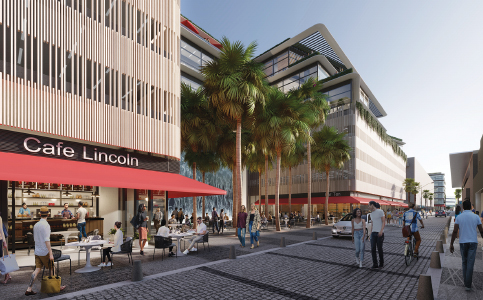Office buildings on Miami Beach-owned parking lots advance

Advertisement

As the City of Miami Beach has worked to diversity its economy and growth to reduce dependence on tourism, two major Class A office space developments in Lincoln Lane have been approved to continue contract negotiations with the city administration.
The commission approved the land use amendments and term agreements for both projects on what are now city parking lots in a 5 to 2 vote last week. They are to be referred to the Planning Board and then go on to a second commission hearing June 22.
The Lincoln Road Holdings LLC – or TPC – a venture involving the Peebles Corporation, Baron Corporation and Scott Robins Companies, would develop on the P27 parking lot, which currently has 151 parking spaces. The developer venture is proposing a 6-story building with 159,000 square feet of retail and offices combined and 43 market rate residences. The asset fee simple appraised value is $39 million, said Rickelle Williams, city economic development director. The company anticipates 61 months for temporary certificate of occupancy (TCO) and parking to be available at 64 months.
Lincoln Road Property Owners LP, a joint venture among Integra Investments, Starwood Capital and Comras Company, would develop lots P25 and P26, which have 192 parking spaces in all. The project would develop a 6-story building on P25 and an 8-story building on P26. The 85,000-square-foot lot would have an asset fee simple appraised value of $59.6 million, without considering the required replacement parking, said Ms. Williams.
Integra Group anticipates TCO for P25 at 63 months and for P26 at 82 months, with parking available at 54 months.
At the May 4 commission meeting, Ms. Williams explained that both projects would sign under a 99-year lease term, with the city receiving a base rent at a minimum of $354 million. “That’s over both projects, with the potential to receive percentage rent of $555 million,” she explained. “The city can also conservatively anticipate ad valorem taxes to the tune of $1.2 million per year for both projects, as compared to the zero dollars the city receives now.”
Additionally, current revenue from the existing parking would be retained, Ms. Williams said, with the option to continue operating the lots or make the developers operate them. “The city would not provide any funding for either of the projects, and each developer already agreed to reimburse the city up to $150,000 for the city’s expenses related to project negotiations and due diligence.”
The rent due to the city, she added, would escalate yearly to the higher of 2% or consumer price index (CPI) with a cap at 3% for Integra, and a variation on rent growth with a cap at 2% to 3% for TPC as the years go by. The rent would reset at year 51 and then again at year 75.
Integra would offer a $2.5 million lump sum payment at referendum and notice to proceed and an additional $1 million once TCO is achieved for both lots, P25 and P26. TPC would offer $2 million in a lump sum at the commencement of construction on the 23rd month.
“The net present value of the percentage rent for Integra [is] at $35.5 million, and TPC, we’re looking at $25.1 million,” said Ms. Williams. “When we look at price per square foot, for that same category of percentage rent, Integra is at $412.92, and TPC is at $412.27, which means that both projects are pretty much in alignment in terms of their financial proposal.”
To accomplish these projects, the comprehensive plan for land use had to be amended to allow for market rate residential projects in the area, since parcel zone public facility use are only allowed to develop affordable or workforce housing.
In addition, the amendment asked for an off-street parking component to replace public parking taken by the project.
Finally, amending the height limits to increase them to 100 feet “will allow for the projects to have greater floor-to-ceiling heights, which are more attractive in terms of Class A office,” said Ms. Williams. “The tenants that we would want to attract to the city will certainly be looking for high ceiling heights.”
These amendments passed the Land Use and Sustainability Committee on April 8, and on April 26 the Planning Board also favored them.
“As we try to move away from being a ‘sun and fun’ capital, we need to replace that with something else,” said Commissioner Ricky Arriola, sponsor of the items. “Something that would look like this project, where we are building Class A office space that would hopefully attract global companies to come here, particularly in industries such as high tech and finance that provide high-paying jobs and an ecosystem that supports all of the entrepreneurial activities happening not just here in Miami Beach, but in the entire Dade County community.”
These developments, he added, could potentially support the repositioning and renovation of Lincoln Road, which has suffered vacancies of more than 30%, by providing day-time traffic of workers who live in the city.
The P27 project originally proposed by TPC had affordable or workforce housing, said Commissioner David Richardson, but after further evaluation of the cash flow, “I believe that the project is better without the workforce housing because the cash flow difference was very significant.”
To replace the loss of affordable housing, Mr. Richardson said he would bring an item to the committee next month in which, if the developments are approved at referendum, the city would allocate the first $5 million from each project for workforce or affordable housing.
Opposition for the developments came from Commissioners Mark Samuelian and Kristen Rosen Gonzalez, who said that the city has “no idea what the impact of [the projects] is going to be on traffic.”
“The evaluations on the properties are off because right now one of these parking lots, with a parking garage on it, is being sold for $92 million,” said Ms. Rosen Gonzalez about the public-private partnership on another parking lot in the area being leased out. “We’re talking about hundreds of millions of dollars in public land that is being given for a $2 million down payment. Then, the rent, $500,000 and you’re capping the CPI at 1% to 2% These are not good terms for the City of Miami Beach or the residents.”
But Deputy City Manager Eric Carpenter said the projects would triple parking revenue for the next 99 years in the $300 million to $400 million range, with 715 parking spaces, more than double the existing number.
“If the voters tell us that they feel it’s a bad deal, then it’s not us saying it,” said Commissioner Alex Fernandez of the referendum that a completed deal would require. “But in order to improve our city and not limit our potential, we need to bring high tech companies into this community, clean industries which contribute positively to our growth.”


